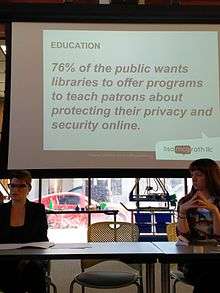Library Freedom Project


The Library Freedom Project teaches librarians about surveillance threats, privacy rights, and digital tools to thwart surveillance.[1] In 2015 the Project began an endeavour to place relays and, particularly, exit nodes of the Tor anonymity network in public libraries.[2][3]
Tor Exit Relay Project
Its pilot project[4] enabled the Kilton Public Library in Lebanon, New Hampshire to become in July 2015 the first library in the United States to host Tor, running a middle relay on its excess bandwidth. This service was put on hold in early September, however, when the library was visited by the local police department after they had received a "heads up" e-mail from Department of Homeland Security highlighting the criminal uses of the Tor network (and which falsely claimed that this was the network's primary usage),[5] whereupon the library began reconsidering the deployment from a public relations perspective.[6][7][8]
After an outpouring of support from the Electronic Frontier Foundation, the Massachusetts and New Hampshire affiliates of the ACLU, the Tor Project itself, an editorial in the local paper Valley News strongly in favor of the pilot project,[9] and virtually unanimous public testimony, the library board of trustees decided on September 15, 2015 to renew the anonymity service, letting stand its previous unanimous vote to establish the middle relay.[10][11] A dozen libraries and their supporters nationwide expressed interest hosting their own nodes after the DHS involvement became public (an example of the Streisand effect),[12][13] and U.S. Rep. Zoe Lofgren (D-Calif) released a letter on 10 December 2015, in which she asked the DHS to clarify its procedures, stating that “While the Kilton Public Library’s board ultimately voted to restore their Tor relay, I am no less disturbed by the possibility that DHS employers are pressuring or persuading public and private entities to discontinue or degrade services that protect the privacy and anonymity of U.S. citizens.”[14][15][16]
In March 2016, New Hampshire state representative Keith Ammon introduced a bill[17] allowing public libraries to run privacy software such as Tor which specifically referenced Tor itself. The bill was crafted with extensive input from Library Freedom director Alison Macrina, and was the direct result of the Kilton Public Library imbroglio.[18] The bill was passed by the House 268-62.[19]
Also in March 2016, the first Tor middle relay at a library in Canada was established, at the University of Western Ontario.[20] Given that the running of a Tor exit node is an unsettled area of Canadian law,[21] and that institutions are more capable than individuals to cope with legal pressures, Alison Macrina has opined that in some ways she would like to see intelligence agencies and law enforcement attempt to intervene in the event that an exit node were established.[22]
Also in March 2016, the Library Freedom Project was awarded the Free Software Foundation's 2015 Free Software Award for Projects of Social Benefit at MIT.[23]
As of June 26, 2016, the Kilton Library is the only library in the U.S. running a Tor exit node. [24]
Workshops

.
Working with ACLU affiliates across the country, the Library Freedom Project provides workshops to educate librarians about "some of the major surveillance programs and authorizations, including the USA PATRIOT Act, section 702 of the FISA Amendments Act, PRISM, XKEYSCORE, and more, connecting the NSA’s dragnet with FBI and local police surveillance".[25] They also discuss current and developing privacy law on both the federal and state levels, in addition to advising librarians how to handle issues like gag orders and National Security Letters. Other topics covered include Privacy Enhancing Technology (PET) that might help library patrons browse anonymously or evade online tracking.
Furthermore, the project conducts training classes for library patrons themselves which focus on on-line security and privacy. The classes can be adjusted to accommodate any level of user, from beginner to advanced, and various security needs.[26] Given that library patrons, including but not limited to domestic violence survivors, political activists, whistle blowers, journalists, and LGBT teens or adults in many communities, face various threat models, the gestalt of digital security is not a matter of one-size-fits-all. In this regard Alison Macrina has remarked at a library conference that " “Digital security isn’t about which tools you use; rather, it’s about understanding the threats you face and how you can counter those threats. To become more secure, you must determine what you need to protect, and whom you need to protect it from. Threats can change depending on where you’re located, what you’re doing, and whom you’re working with.” [27]
The Library Freedom Project is a member of the torservers.net network, an organization of nonprofits which specializes in the general establishment of exit nodes via workshops and donations. [28]
Funding
In January 2015 the Library Freedom Project received $244,700[29] in grant funding from the Knight Foundation,[30] and in January 2016 $50,000 from the Rose Foundation's Consumer Privacy Rights Fund[31] (the fiscal sponsor of that grant being the Miami Foundation).[32]
References
- ↑ Library Freedom Project. "Our Work". Library Freedom Project.
- ↑ "Tor Exit Nodes in Libraries - Pilot (phase one) | The Tor Blog". Blog.torproject.org. Retrieved 2015-09-16.
- ↑ "Tor Project Pilots Exit Nodes In Libraries - Slashdot". Yro.slashdot.org. 2015-07-31. Retrieved 2015-09-16.
- ↑ "Lebanon library at center of internet privacy debate in shutting off its Tor server". Concord Monitor. 2015-09-11. Retrieved 2015-09-16.
- ↑ "Letter to Kilton Library, signed by Library Freedom Project, ACLU, EFF, and significant others" (PDF). Library Freedom Project. 2015-09-02. Retrieved 2016-01-15.
- ↑ Angwin, Julia (2015-09-10). "First Library to Support Tor Anonymous Internet Browsing Effort Stops After DHS Email". ProPublica. Retrieved 2015-09-16.
- ↑ "Support Tor and Intellectual Freedom in Libraries | EFF Action Center". Act.eff.org. Retrieved 2015-09-16.
- ↑ "First Library To Support Anonymous Internet Browsing Halts Project After DHS Email - Slashdot". Yro.slashdot.org. 2015-09-11. Retrieved 2015-09-16.
- ↑ "Editorial: Privacy Concerns and the Kilton Library | Valley News". Vnews.com. Retrieved 2015-09-16.
- ↑ Glaser, April (2015-09-11). "How New Hampshire's Lebanon Libraries fought back against DHS fearmongering about Tor". Slate.com. Retrieved 2015-09-16.
- ↑ "Despite Law Enforcement Concerns, Lebanon Board Will Reactivate Privacy Network Tor at Kilton Library | Valley News". Vnews.com. 2015-06-15. Retrieved 2015-09-16.
- ↑ "Small town library stands up to government scare tactic aimed at digital privacy tool". Radio Free. 2015-09-16. Retrieved 2015-09-21.
- ↑ "SCREW YOU, FEDS! Dozen or more US libraries line up to run Tor exit nodes". Theregister.co.uk. Retrieved 2015-09-21.
- ↑ https://lofgren.house.gov/news/documentsingle.aspx?DocumentID=398038
- ↑ http://www.dailydot.com/politics/tor-libraries-dhs-zoe-lofgren-letter/
- ↑ http://motherboard.vice.com/read/congresswoman-asks-feds-why-they-pressured-a-library-to-disable-its-tor-node
- ↑ http://www.gencourt.state.nh.us/bill_status/billText.aspx?id=796&txtFormat=html
- ↑ O'Neill, Patrick (2016-03-10). "New Hampshire bill allows for libraries' usage of encryption and privacy software". The Daily Dot. Retrieved 2016-03-10.
- ↑ https://legiscan.com/NH/text/HB1508/id/1288060
- ↑ "Library in FIMS joins global network fighting back against digital surveillance, censorship, and the obstruction of information". FIMS News. 2016-03-16. Retrieved 2016-03-16.
- ↑ Pearson, Jordan (2016-09-25). "Can You Be Arrested for Running a Tor Exit Node In Canada?". Motherboard. Retrieved 2016-03-16.
- ↑ Pearson, Jordan (2016-03-16). "Canadian Librarians Must Be Ready to Fight the Feds on Running a Tor Node". Motherboard. Retrieved 2016-03-16.
- ↑ "Library Freedom Project and Werner Koch are 2015 Free Software Awards winners". Free Software Foundation. 2016-03-19. Retrieved 2016-03-19.
- ↑ "Browse free or die? New Hampshire library is at privacy fore". DailyMail.com. 2016-06-26. Retrieved 2016-06-26.
- ↑ "Workshops – Library Freedom Project". libraryfreedomproject.org. Retrieved 2015-11-10.
- ↑ "Community classes – Library Freedom Project". libraryfreedomproject.org. Retrieved 2015-11-10.
- ↑ Enis, Matt (2016-03-31). "You are here: Home / Advocacy / Library Freedom Project, NYCLU Discuss Privacy and Online Security Library Freedom Project, NYCLU Discuss Privacy and Online Security". Library Journal. Retrieved 2016-05-03.
- ↑ Steele, Sharon. "Tor at the Heart: Torservers.net".
- ↑ http://www.dailydot.com/politics/internet-freedom-heroes-2015/
- ↑ "The Library Freedom Project". Knight Foundation. Retrieved 2015-09-16.
- ↑ https://libraryfreedomproject.org/rosefunding/
- ↑ http://rosefdn.org/consumer-privacy-rights-fund/grantees
External links
- Official website
- An extensive interview on Law and Disorder Radio with Alison Macrina, the founder and director of the Library Freedom Project
- Alison Macrina gives a presentation at the 32nd Annual Chaos Communication Congress (at 44:20) in Hamburg, Germany in conjunction with Tor
Coordinates: 43°38′57″N 72°18′37″W / 43.649167°N 72.310278°W